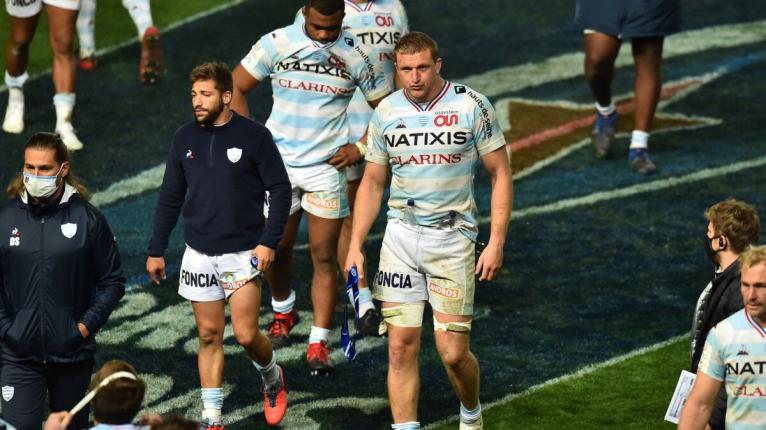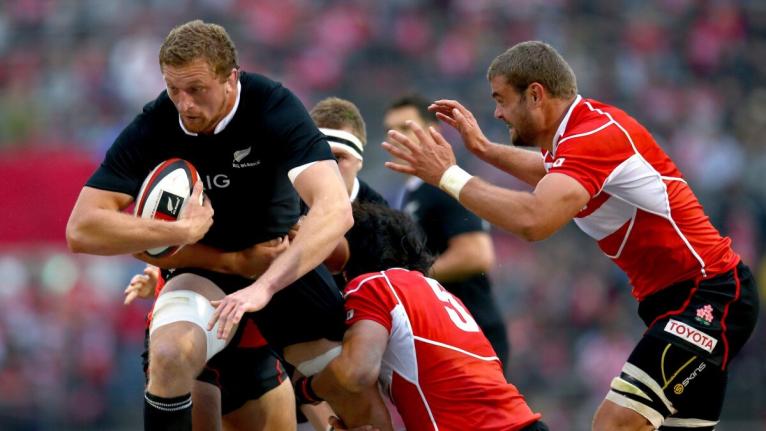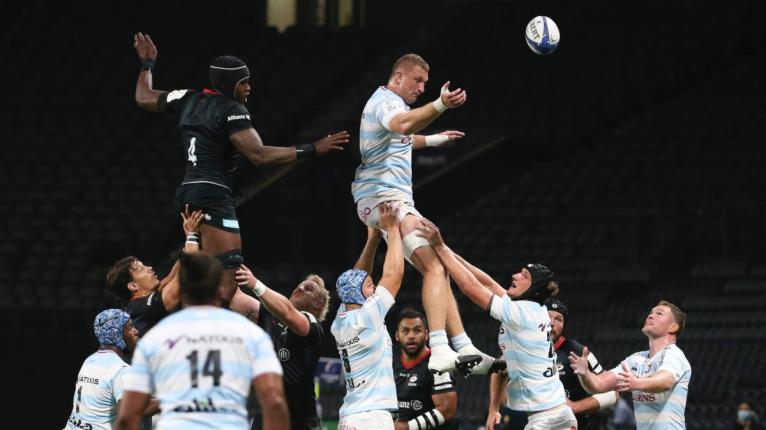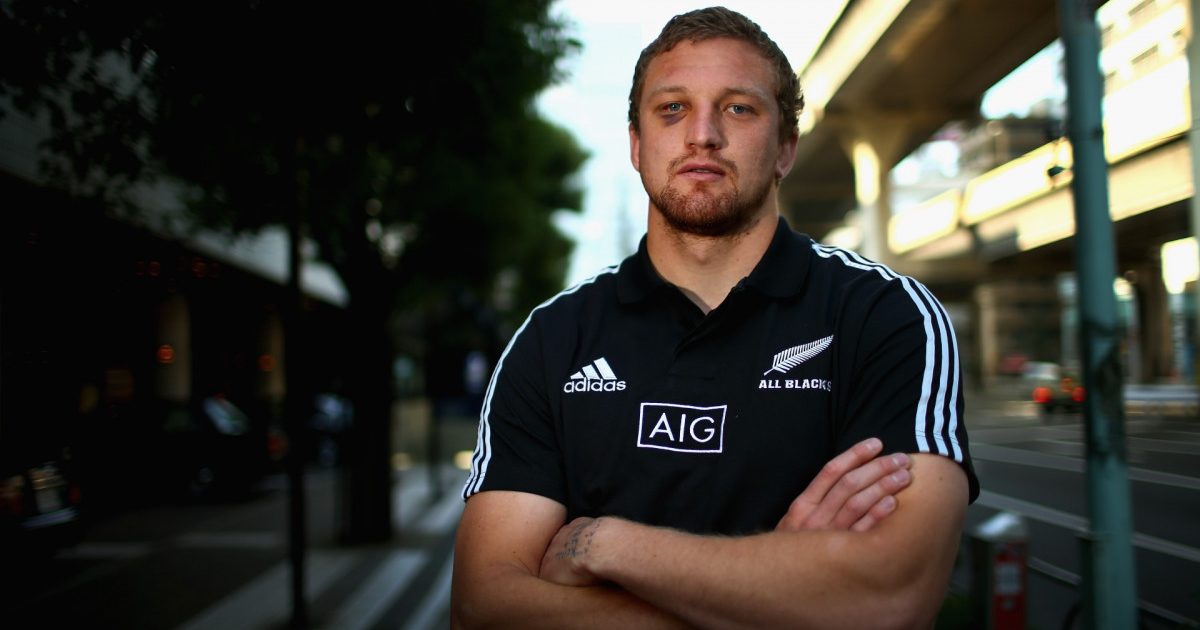'When I was skinny as a rake, I wasn't very filled out so everyone would want a fight with you if you were in a nightclub'

It was a Christmas with a difference for former All Blacks lock Dominic Bird and family in Paris recently. There they were, the Racing 92 second row, wife Helena and sons Austin (8) and Arthur (2) living in one of the world’s most vibrant cities but confined to barracks due to the ongoing pandemic effectively shutting down the sprawling metropolis by the Seine.
“It’s such a pain hearing about everyone going to the beach and having long holidays,” quipped Bird to RugbyPass, reflecting on the very different communique coming his way from home 19,000 kilometres away. “I know that time in New Zealand is really good but here it is beautiful.
“The Parisians doll up the city really nicely. We see it on TV in New Zealand growing up, see the winter Christmas. It’s a really special vibe and I know it was the same in London (where he spent a pre-rugby gap year). It’s cool, but we’re still in a lockdown so it wasn’t a big Christmas.
“At the moment there’s not a lot (to do). It’s very much a kids’ routine, get the boys off to school and creche. A couple of errands here and there but it’s very quiet. The most exciting thing is a walk in the park or I just go in the spa, something like that. There are no real activities.”
It was May 2018 when Bird’s switch to Top 14 heavyweights Racing was agreed, six seasons of Super Rugby with the Crusaders and then the Chiefs ended by an urge to try something very different. That seed was originally planted by events a decade earlier, gap year travels around Europe occurring after he wrapped up schooling in Hawkes Bay and said goodbye to the family farm in Waipukurau.

“I did eight months in the UK with my uncle. I played a little bit for Esher, just the development side. Had a bit of fun and then went and spent a little time working in Shropshire by the Welsh border. I was working at PGL, an outdoor adventure centre for kids in camp.
“There were 250 staff. Most were foreigners there for the same gap-year buzz. You were teaching high ropes, archery, whatever, really simple but fun stuff and something totally different. I knew I wanted to play rugby after but I just wanted to have that time. I also got around Europe a bit and drank myself senseless as an 18-year-old. Had a lot of fun, but I knew I wanted to come back and take rugby seriously after that.
“My mum had looked into Lincoln University in Christchurch, which lined up really nicely with the Canterbury rugby academy. There is a good pathway and that was very logical. Tough to leave my home province but I don’t regret it.”
His rugby tutelage in Hawkes Bay had started early. John Bird represented his country at an age-grade level and the allure of the All Blacks jersey wasn’t long rubbing off on his curious son. “A big part of it was the inspiration of my dad. He played Junior All Blacks, so that was U21s, and he played a lot of games and captained Hawkes Bay.
“As any kid does they look up to their dad, and then just that power of the All Blacks and that jersey, dad telling me if you want to be like Zinzan Brooke you have to eat your broccoli. Being reminded every day of that glowing aura of the All Blacks as a kid was so massive.
“That does stick with you as you grow up. It morphs and changes and becomes a dream that isn’t so far away. When you are a five-year-old it’s way out there, but then you can see it is a pathway and it’s something achievable. It started very young. Grassroots rugby is massive, such a big thing in Central Hawkes Bay, and Saturday mornings were always big. Tons of kids from all over and different teams coming to one place to play.
“I started off barefoot at the age of five and have clear memories of frozen toes and the like. It was great fun, very much a family thing, all the dads helping out with the team. My dad was often my coach as well, special times. I was always tall but never the whole foot-and-a-half like I am above everyone else now.
“Growing up on a farm, that [helping out] is your life. You really are semi-isolated in a sense, even though we weren’t too far from the town. But I was out on the farm every day down in the yard or the woolsheds helping dad and I treasure growing up on a farm.
The fans have turned up en masse to see Richie @LiamMessam & Dominic Bird in Dunedin! pic.twitter.com/HycaVRHaTI
— All Blacks (@AllBlacks) June 12, 2014
“It teaches you a lot about hard work at a very young age and you just get to be outdoors… we do hear that a lot, especially in New Zealand, your guys like the Whitelocks. You look at them and they have all got the farmers’ strength. Without a doubt, it does pay dividends. If you’re helping out you’re lifting fence posts or shifting stuff around, using your body at a young age. It makes a difference.”
Bird, whose younger sister Ellie is a 1.96-metre elite level netballer, was two metres tall when he left school and 2.04m at 19 before stretching to 2.06m, 6ft 9ins in old currency. “Suddenly you shoot up and you’re sticking out above everyone else. When I was skinny as a rake, I wasn’t very filled out then so everyone would want a fight with you if you were in a nightclub.
“It was ‘no thanks’. But yeah, it’s something you’re very conscious of at a very young age. Then as time goes on and you mature you start to not care at all. Now you don’t think twice.”
It’s now seven years since Bird last represented the All Blacks, but he is still on the record books as their tallest ever player. “That’s an interesting one. I’m very proud of my games with the All Blacks but that’s a funny one because I didn’t do anything to be the tallest. I just turned up. But hey, it’s cool. I can’t knock it because it is something special.”

Bird debuted in 2013 against Japan, managed a second All Blacks appearance at Scotland the following year, but that was that. A school of thought is that rather than stay at the Crusaders, where there was a slew of All Blacks-chasing locks contesting Super Rugby spots, he might have been better changing franchises earlier than his 2016 switch to the Chiefs.
“I look at it now and see it both ways. Maybe I should have gone and just played because now knowing myself, playing is where you really learn. Okay, you can learn off those (Test) guys around you, you’re basically copying what they do and picking the best of what you see in everyone. But I do think playing is key.
“It was nothing against the Crusaders, more about game time and a bit of a fresh start. But I learnt a lot of my quality-based skills at the Crusaders in those early years… I did have a couple of badly timed injuries but you can’t say there would have been more caps – I may still have been sitting behind those other guys. But I know I have come on a hell of a lot as a player since then.”
Moving to France accelerated this maturation, the final part of Bird’s first season seeing his game leap to another level. “When you push for the All Blacks jersey when you are in the maybe zone it’s very stressful. I know a lot of other players feel that too and I put a lot of stress on myself, which was unnecessary. That can affect the way you play too because you’re thinking about that end goal rather than actually forgetting about it and just playing your footy.
🧒Cette saison, Dominic Bird est le parrain de l'école de rugby de Colombes.
Hier, il a participé aux photos officielles et a animé l'entrainement des moins de 12 ans 🏉#RacingFamily #ToutCommenceIci pic.twitter.com/kZivmb89qv
— Racing 92 (@racing92) October 17, 2019
“I’m proud of what I achieved. I could have stayed and played for the All Blacks some more maybe, but what I enjoy now is playing stress-free footy, just going out there and doing it just for yourself and family, being just really clear and calm about it.
“I found it myself. In New Zealand, I did work closely with a couple of mental skills guys and that stuff all sticks. It’s just slowly maturing and piecing it all together, and then also my body was definitely more ready for it. I have matured and play to my strengths. I’m a bit more intelligent about what I do.
“It has felt good to be able to notice that on the field whereas in the past I would be working hard on something but then I don’t actually feel a big change on the pitch. It’s going well, understanding that being tall you do have advantages, and that comes with experience. You do play a slightly different game to a short guy.
“I have put on a fair bit more weight. At the moment I’m around 124kgs. Most of my career in New Zealand I would have been 118/119kgs. The style in France allows for it but it’s a bit of a natural thing as well. When I was younger, I had to scoff down the tucker to put on the weight because I would burn it so quick, but now it’s not so difficult. I can hold my weight a bit easier.

“In terms of jumping, white men can jump. Sometimes I’m told I feel like a sack of spuds but I like to think I’m reasonably springy. I don’t think the few kilos makes much difference, you have just to be technically correct in the air. I’m really big on having a confident hooker and now as lineout caller, having a tall man at the back. I always prefer myself to be on the 15 – nothing beats coming in there having speed and perfect timing.
“In France, we always stack our best jumpers and lifters middle to front whereas it’s often known that back ball can be the best-attacking ball. Backs love that, getting it off the top on the 15-metre line, it’s as good as it gets. We’re making good changes and the Arena helps. Every second weekend we know the weather is going to be perfect because of the roof. It makes a difference.”
It was Dan Carter who was a conduit in initially convincing Bird to come to Racing, the World Cup-winning All Blacks out-half providing a compelling insight to the lay of the land there. Now there is no shifting him from Paris any time soon.
Set to turn 30 in April, the lock is signed until the end of the 2022/23 Top 14 season and Bird, who has seen this weekend’s originally planned European tussle with Harlequins replaced by a Top 14 duel versus Toulon, sees himself playing for much longer after that before having to seek out a post-rugby career.
🏉Essssaaaaaaaaai de Dominic Bird ! Belle touche des Ciel et Blanc met les avants dans l'avancée ! (⌚️51')
💙🤍 24 – 8 🦅#R92vCO #RacingFamily pic.twitter.com/hq1pvME7oU
— Racing 92 (@racing92) December 13, 2020
“Leaving the All Blacks behind was tough but I was very ready to move on to the next challenge and everyone knows the contracts are much bigger over here in Europe. Paris is amazing, one of the most visited places in the world. You don’t have to google or search what it is like there.
“And Dan Carter was here. I’d a couple of phone calls with him just to get a bit of an insight. He spoke nothing but good words and since I arrived I have realised that it is not just one of the top five clubs in Europe in terms of playing ability, quality of play or anything but in terms of the way players are treated, the quality of life of everything, we are spoiled.
“I’m currently 29 and would like to think I could play to 36 if not longer. Second rows are kind of special in the sense that guys can play a bit longer. At no stage lately have I thought I’m ready to have a breather or ready to have a change-up. I’m still very, very hungry for it.
“We’ll keep rolling for as long as we can and then afterwards life is likely to be in New Zealand. I’m toying with a lot of different things. Coaching is definitely one. I’ve done a lower-level course and know I have the skills to do it and the attitude to learn more.
“But then going back to New Zealand I have looked at different pathways through the police force. I have got a diploma in environmental science, which is interesting but at the same time, I’m not really too sure I want to go down that path yet. In the coming year or two I’m going to do some business studies and look into some different things, just broaden the mindset a little bit to be sure I’m doing what I want to be doing.”





































































